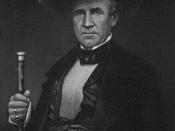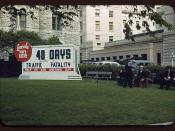From the establishment of America, conflicting social and political views have separated the north and south into two very different cultures. While most southern states became dependent on slavery, northern states industrialized and modernized. They also formed very different opinions on westward expansion and slavery. As American began to expand it's boarders, so did animosity between the two regions. The political problems dealing with the United States fulfillment of Manifest Destiny and expansion into western territories exposed many peoples' moral obligation to the institution of slavery.
Though slavery had been an important component of American agriculture for almost 200 years, in the mid eighteen-hundreds the argument over the unethical principles of the enslavement of man exploded into an ideological crusade between free and slave-owning states. People in the northern states had almost always been apposed to slavery but peoples' moral opposition to it increased, eventually leading up to the civil war.
With the Fugitive Slave law in operation, a freed black man was stripped of all his rights. Some northerners reacted by warning freed men of slave catchers. It was assumed that all free black men were escaped slaves. On top of that, in the case of Scott vs. Sanford, it was ruled that nowhere in the constitution was a slave considered a citizen of the United States. In March 1857, supreme court justice Roger B. Taney wrote that in the writing of the Constitution, people of African decent were not intended to be 'citizens'. The fiery debate over slavery became even stronger when abolitionists like John Brown used force to argue their point. In an event known as the Pottawatomie Creek massacre, John Brown and his men brutally murdered proslavery men. In a letter from Edward Bridgman, he wrote that men had been butchered-ears cut off and bodies thrown...


